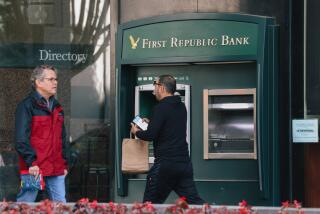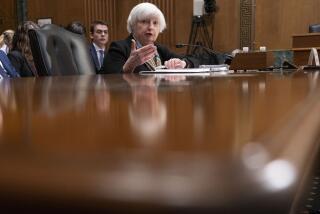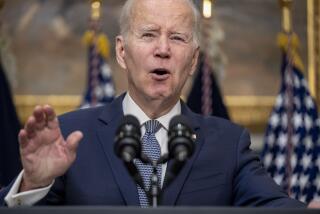Central Banks Intervene Again to Bolster Dollar : Treasury Secretary Downplays Deficit as Source of Investor Anxiety, Asks for Time to Solve Problem
- Share via
WASHINGTON — The world’s major central banks, continuing their coordinated effort to prop up the dollar, stabilized the U.S. currency Friday for a second consecutive day. But traders said that further skirmishes in the currency markets loom in the coming week.
The second day of global dollar buying by central banks pushed the currency back up to 123 Japanese yen and 174.74 West German marks before market pessimism reversed the tide. The dollar retreated to 122.56 yen and 173.70 marks, only slightly above its Thursday close.
Friday’s intervention by the central banks was not as heavy as Thursday’s, when the Federal Reserve and similar institutions from other industrial nations bought an estimated $800 million to arrest the dollar’s earlier slide. But it was visible nevertheless.
The bond and stock markets, which had been jolted by the dollar’s earlier slide, also continued their recovery. In the stock market, the Dow Jones industrial index rose 9.96 to 2,062.41. Bond prices also gained, pushing interest rates lower.
Even so, analysts remained unconvinced that the battle is over.
Stephen Axilrod, vice chairman of Nikko Securities International, conceded that the intervention had convinced the markets that the United States is serious about stabilizing the dollar. But he said investors still lack confidence that Washington will put its economic house in order.
While speculating that the dollar has about reached bottom, Axilrod predicted that “it will take a few more positive steps from the Administration and probably a little more intervention” before the skirmishing is over. “They’ll be tested one more time,” he said.
Not Worried About Dollar
Meanwhile, Treasury Secretary Nicholas F. Brady, whom President-elect George Bush has named to head his new economic team, disputed suggestions that it is apprehension about the U.S. budget deficit that is driving the dollar down. He said he is not worried about the dollar.
“The currency markets are really at the same levels they were in January last year,” Brady said in an interview on NBC’s “Today Show.” “Markets go up and down. . . . I don’t really worry about it very much.”
The Treasury secretary also called on Americans and others to “give the vice president a little time to put his team together” before coming to any judgments about budget prospects. “I’m confident things will be worked out,” he said. “I think this is overblown.”
Brady also took issue with predictions by some analysts that the Federal Reserve will soon raise interest rates if the new Administration and Congress cannot arrive at a budget compromise.
“I don’t see anything in the figures right now that would indicate that interest rates are going to rise,” he said.
At the same time, New Hampshire Gov. John H. Sununu, whom Bush has selected as his White House chief of staff, said Bush will soon begin “communicating with” members of Congress personally on how to tackle the budget deficit problem.
“I think the most important ingredient in dealing with this deficit is cooperation between the White House and . . . (Capitol) Hill,” Sununu said on ABC’s “Good Morning America” program. “This is going to be a bipartisan effort.”
The dollar was also bolstered by remarks by Manuel Johnson, the Federal Reserve Board’s vice chairman, who dismissed the past week’s run on the dollar as “speculative” and warned currency traders against overreacting.
Johnson also took issue with the notion that the markets are demanding prompt action on the budget. “There’s a three-month transition period” for Bush, he noted. “They are still developing their plans. . . . The markets can’t possibly be expecting action immediately.”
More to Read
Sign up for Essential California
The most important California stories and recommendations in your inbox every morning.
You may occasionally receive promotional content from the Los Angeles Times.













